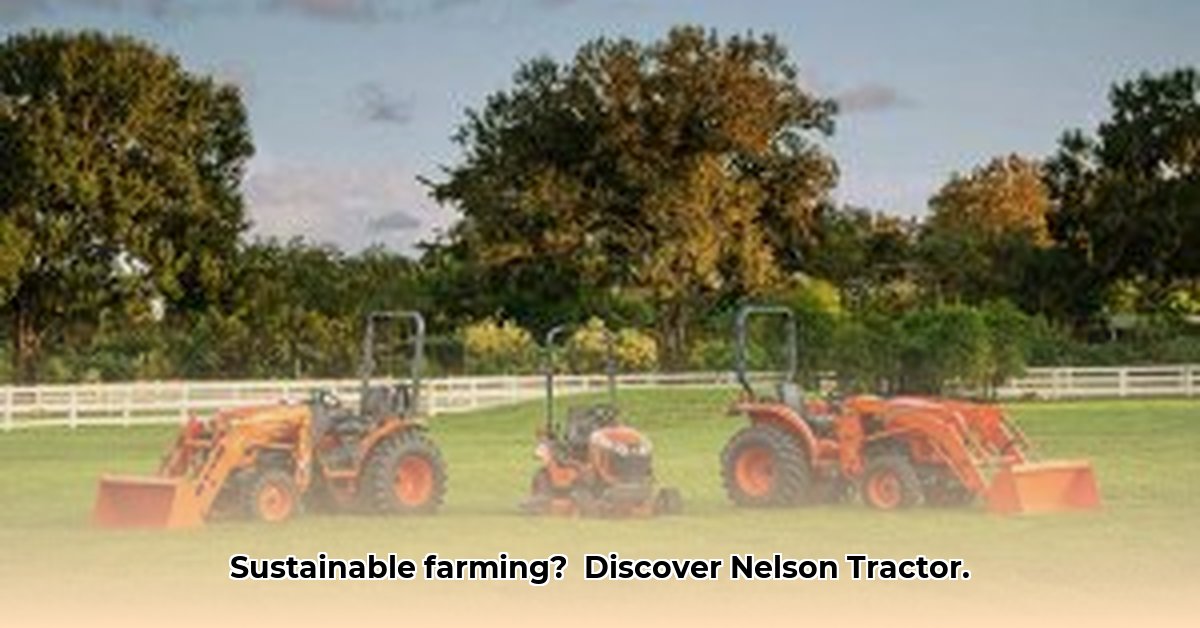
Nelson Tractor, a cornerstone of the North Georgia agricultural community for over 75 years, is more than just a farm equipment dealership; it's a vital link between farmers and the technology that shapes their livelihoods. Located in Blairsville, GA, Nelson Tractor's longevity speaks volumes about its deep understanding of local farming needs and the evolving challenges facing the region's agricultural sector. For examples of other successful agricultural businesses, check out this Valdosta Tractor Supply case study. This case study explores Nelson Tractor's current operations, its potential role in promoting sustainable agriculture, and its future prospects within a rapidly changing industry. We'll examine how the company can leverage its position to enhance the sustainability of North Georgia farming and address some of the key obstacles to wider adoption of environmentally friendly practices.
Nelson Tractor's Current Operations: A Foundation for Sustainability
Nelson Tractor offers a comprehensive suite of services, including sales, parts, and expert repair services for leading brands such as Kubota and New Holland. This full-service approach provides farmers with a convenient, one-stop shop for all their equipment needs. However, a deeper analysis is necessary to fully assess the extent to which their current operations actively support sustainable farming practices. For example, does their sales strategy prioritize fuel-efficient models and sustainable technologies? What training and support do they offer farmers on optimizing the environmental performance of their equipment? These questions are crucial to understand Nelson Tractor's current contribution to sustainable agriculture.
Sustainable Practices: Opportunities for Growth
The adoption of sustainable practices is paramount for the long-term health of North Georgia's agricultural sector. For Nelson Tractor, embracing sustainability translates to much more than simply offering eco-friendly equipment; it involves actively partnering with farmers to implement sustainable methods and fostering a culture of environmentally conscious farming.
Key opportunities exist across several areas:
- Precision Farming Technologies: Implementing GPS guidance, variable rate technology (VRT, which optimizes fertilizer and pesticide application), and soil sensors offer significant potential for increased efficiency and reduced environmental impact. Precision agriculture minimizes resource waste while optimizing yields.
- Water-Efficient Irrigation: Transitioning to drip or subsurface drip irrigation systems significantly reduces water waste compared to traditional methods, a particularly important consideration given North Georgia's climate. This crucial step conserves water resources and improves overall efficiency.
- Renewable Energy Integration: Exploring solar power for farm operations and potentially biogas digesters to convert agricultural waste into energy present viable paths to reduce carbon footprint and operational costs, aligning with broader environmental sustainability goals.
Challenges and Barriers to Adoption
Despite the compelling advantages of sustainable farming, several obstacles hinder widespread adoption among North Georgia farmers:
- High Upfront Costs: The initial investment in sustainable technologies can be significantly higher than traditional methods. This cost barrier may dissuade farmers, particularly those with smaller operations or limited access to financing.
- Farmer Education and Training: Effective utilization of precision farming technologies, water-efficient irrigation, and renewable energy sources necessitates appropriate training and ongoing support. Without adequate knowledge and technical assistance, adoption rates will remain low.
- Technology Accessibility and Infrastructure: Access to reliable internet and the digital infrastructure needed to support precision agriculture can be challenging in rural areas, limiting the practicality of certain sustainable technologies.
Potential Future Scenarios for Nelson Tractor
The future success of Nelson Tractor is inextricably linked to its approach to sustainable agriculture. Two contrasting scenarios emerge:
Scenario 1: Proactive Leadership in Sustainability: A proactive approach, involving significant investment in education, partnership development with technology providers, and offering financing options for farmers, would position Nelson Tractor as a leader in promoting sustainable practices. This strategy would foster strong farmer relationships and potentially increase market share.
Scenario 2: Reactive Approach to Sustainability: A more cautious or reactive strategy might lead to missed opportunities and a decline in market competitiveness as other companies aggressively embrace sustainable agriculture. Such a strategy would risk losing ground to competitors and potentially negatively impacting the long-term viability of Nelson Tractor and the North Georgia farming community.
Conclusion: A Sustainable Future for North Georgia Farming
Nelson Tractor stands at a critical juncture. Its response to the opportunities and challenges surrounding sustainable agriculture will determine not only its own future success but also the broader environmental and economic health of the North Georgia agricultural sector. By actively promoting and supporting the adoption of sustainable farming technologies, Nelson Tractor can play a pivotal role in shaping a more environmentally responsible and economically robust future for the region's farmers, securing its own long-term prosperity while contributing to a healthier planet. A comprehensive strategy incorporating farmer education, strategic partnerships, and access to financing will prove essential in this transition.